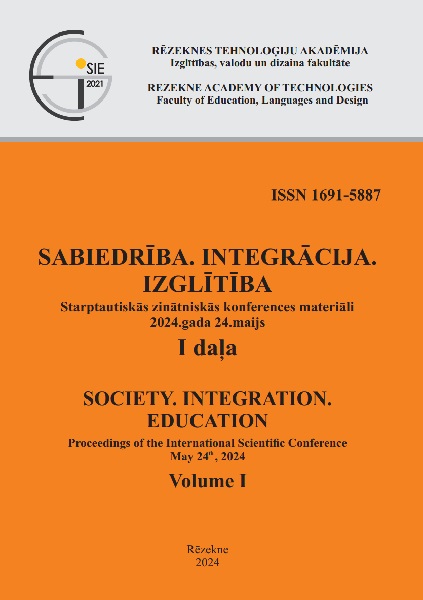ENGAGEMENT OF STUDENTS IN ONLINE LEARNING PLATFORMS: FOLLOW-UP STUDY IN LITHUANIAN GENERAL EDUCATION SCHOOLS
DOI:
https://doi.org/10.17770/sie2024vol1.7866Keywords:
engagement of students, general education schools, online learning platformAbstract
Online learning platforms with integrated tools of learning analytics (LA) and artificial intelligence (AI) are growing in popularity in general education in Lithuania. Such platforms have a number of advantages in terms of the teaching-learning process, however, there is a lack of research about such aspects of use platforms in general education schools. The follow-up study was organized in schools that participated in the DIMA project for three months and tested different platforms with learning analytics and artificial intelligence components - LearnLab and Eduten Playground. The study aimed to monitor children's progress with the platform, tracking interest and engagement. The same questionnaire was given 3 times within the period of one month. In total, 977 responses were received: 404 students completed in first time; 281 completed second and 252 completed 3d time. Results have showed that the students feel positive about working with online learning platforms, moreover every single time are becoming more engaged in the learning process, since they get acquainted navigation and operation of the program. As a result, the engagement of the students into online learning platforms depends not only on the quality or other features of online learning platforms, but also the ability of students to navigate within the program.
References
Bernacki, M., Nokes-Malach, T., Richey, J. E., & Belenky, D. M. (2016). Science diaries: A brief writing intervention to improve motivation to learn science. Educational Psychology, 36(1), 26-46.
Butz, C.J., Hua, S., R.B. Maguire, R.B. (2006). A Webbased Intelligent Tutoring System for Computer Programming. Web Intelligence and Agent Systems, pp 77–97.
Cabero-Almenara, J., & Llorente-Cejudo, C. (2020). Covid-19: transformación radical de la digitalización en las instituciones universitarias. Campus virtuales, 9(2), 25-34.
Chatti, M. A., Dyckhoff, A. L., Schroeder, U., & Thüs, H. (2012). A reference model for learning analytics. International Journal of Technology Enhanced Learning, 4(5-6), 318-331.
Christopoulos, A., Kajasilta, H., Salakoski, T., & Laakso, M. J. (2020). Limits and virtues of educational technology in elementary school mathematics. Journal of Educational Technology Systems, 49(1), 59-81.
Davis, F. D. (1989). Perceived usefulness, perceived ease of use, and user acceptance of information technology. MIS quarterly, 319–340.
Hamed, M. A., Abu-Naser, S. S., & Abualhin, K. S. (2018). Intelligent Tutoring System Effectiveness for Water Knowledge and Awareness. International Journal of Academic Information Systems Research (IJAISR). 2 (4), p.p. 18-34.
Ifenthaler, D., Gibson, D., Prasse, D., Shimada, A., Yamada, M. (2020) Putting learning back into learning analytics: actions for policy makers, researchers, and practitioners. Education Tech Research Dev. https://doi.org/10.1007/s11423-020-09909-8
Kaila, E., Rajala, T., Laakso, M. J., Lindén, R., Kurvinen, E., Karavirta, V., & Salakoski, T. (2015). Comparing student performance between traditional and technologically enhanced programming course. ACE, 160, 147-154.
Kurvinen, E., Kaila, E., Laakso, M. J., & Salakoski, T. (2020). Long-term effects on technology enhanced learning: The use of weekly digital lessons in mathematics. Informatics in Education.
Kurvinen, E., Kaila, E., Laakso, M. J., & Salakoski, T. (2020). Long term effects on technology enhanced learning: The use of weekly digital lessons in mathematics. Informatics in Education.
Laakso, M.-J. (2010). Promoting Programming Learning. Engagement, Automatic Assessment with Immediate Feedback in Visualizations. TUCS Dissertations no 131. Access online: https://www.utupub.fi/bitstream/handle/10024/66222/TUCSDissertations131.pdf?sequence=1&isAllowed=y
Long, P., Siemens, G. (2011). Penetrating the Fog: Analytics in Learning and Education. EDUCAUSE Review. 5. 30-32. 10.17471/2499-4324/195.
Mangaroska, K., Giannakos, M. (2018). Learning analytics for learning design: A systematic literature review of analytics-driven design to enhance learning. IEEE Transactions on Learning Technologies 12 (4), 516-534.
Mangaroska, K., Vesin, B., & Giannakos, M. (2019, March). Cross-platform analytics: A step towards personalization and adaptation in education. In Proceedings of the 9th international conference on learning analytics & knowledge (pp. 71-75).
Manny-Ikan, Berger-Tikochinski, Marmor, 2016, Research Evaluation of "Matific", 2016, žiūrėti prieigą online: https://www.matific.com/home/resources/media/documents/HS-matific-study.pdf
Mayer, R. E. (2019). Computer games in education. Annual review of psychology, 70, 531-549.
Moissa, B., Gasparini, I., & Kemczinski, A. (2015). A systematic monline learning platforms ing on the learning analytics field and its analysis in the massive open online courses context. International Journal of Distance Education Technologies (IJDET), 13(3), 1-24.
Pineda, A. F., & Cadavid, J. M. (2018). A systematic literature review in Learning Analytics. In Workshop de Ciência de Dados Educacionais (WCDE), Anais, CBIE 2018 (pp. 1-10).
Rodrigo, M. M. T., Baker, R. S., Agapito, J., Nabos, J., Repalam, M. C., Reyes, S. S., & San Pedro, M. O. C. (2012). The effects of an interactive software agent on student affective dynamics while using; an intelligent tutoring system. IEEE Transactions on Affective Computing, 3(2), 224-236.
Romero, C., Ventura, S. (2013). Predicting students' final performance from participation in on-line discussion forums. Computers & Education, 68, 458-472.
Rupšienė, L., Škėrienė, S., Girdzijauskienė, R., & Pranckūnienė, E. (2021) Dirbtinio intelekto ir mokymosi analitikos plėtra mokyklose: scenarijai ir rekomendacijos. Klaipėdos Universiteto leidykla
Selevičienė, E. (2020). Effectiveness and Acceptance of Web 2.0 Technologies in the Studies of English for Specific Purposes in Higher Education. Doctoral dissertation. Mykolas Romeris University.
Vourikari, R., Punie, Y., Brečko, B., & Ferrari, A. (2016). The Digital Competence Framework for Consumers. JRC Science for Policy Report, doi, 10, 838886.
Youssef, Shiban & Schelhorn, Iris & Jobst, Verena & Hörnlein, Alexander & Puppe, Frank & Pauli, Paul & Mühlberger, Andreas. (2015). The appearance effect: Influences of virtual agent features on performance and motivation. Computers in Human Behavior. 49. 10.1016/j.chb.2015.01.077.
Zhu, C., & Urhahne, D. (2018). The use of learner response systems in the classroom enhances teachers' judgment accuracy. Learning and Instruction, 58, 255-262.






